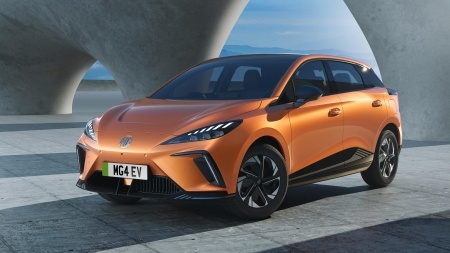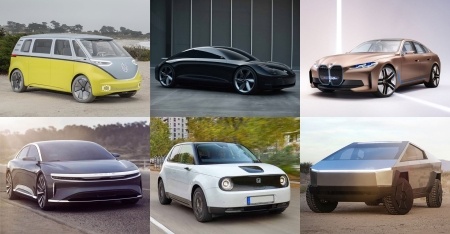
Used Electric Cars
With more models to choose from, lower prices, and better performance than ever before, electric cars are on the up in a big way. But while the latest models grab the headlines, yesterday’s electric cars still provide reliable and cheap green motoring. With the cheapest used electric cars costing only £5,000 or so, buying a second-hand electric car could save you a fortune.
But as with any second-hand car purchase, buying a used electric vehicle comes with some risks. So before you rush in, do your research and thoroughly check the car. In this guide, we’ll cover some of the key things you need to look out for to make sure you get the second-hand car of your electric dreams.
Why buy a second-hand electric car?
Electric cars are getting more affordable as they hit the mainstream, but the cheapest new electric car still costs around £17,000. A second-hand electric car offers a viable alternative if your budget won’t stretch that far. For example, we found a high-spec, five-year-old Nissan Leaf on Autotrader for around £8,300.
Like a new electric car, a used one is very cheap to run. The good news is that it also qualifies for most low-emission exemptions and grants. And with fewer moving parts, you’ll avoid some of the big bills associated with ageing petrol cars – like a timing belt change or new exhaust.
There’s also no shortage of used electric cars to choose from. We found more than 3,000 on Autotrader in April 2020. And that number is likely to go up fast. The choice of models available depends on the age of the car you’re looking for. Go back only five years, and you can choose from fewer than 15 mainstream models. If you’re buying a car that’s just a few months old, you get even more options.
The most common second-hand electric cars in the UK
To have the widest choice of second-hand electric cars, you need to aim for models that were most popular when new. This means you’re primarily looking at choosing between the Nissan Leaf, BMW i3, Renault Zoe or Tesla Model S. And because the first Leaf has been around since 2011, it’s also one of the cheapest used electric car buys.
The launch of more high-performance and premium models is changing the market rapidly though. According to the analysis done by NextGreenCar, Tesla’s Model 3 didn’t arrive in big numbers until the second half of 2019, but by the end of the year, it was the UK’s biggest-selling electric car. And you can already pick up a second-hand Model 3… Although high demand means it still comes with a pretty hefty price tag – for the moment, anyway.
Other premium cars lose their value more quickly. According to the CAP valuation guide, the Jaguar i-Pace, Audi E-Tron and Tesla Model X all depreciate significantly. So a canny used electric car buyer could bag themselves one of these statement high-spec electric cars for a bargain soon.
How many electric cars are there?
UK motorists have bought more than 105,000 new electric cars since the start of 2015. And last year saw electric cars overtake plug-in hybrids in popularity.
| Year | Electric cars | Plug-in hybrids |
|---|---|---|
| 2020 (to March) | 18,256 | 13,662 |
| 2019 | 37,850 | 34,734 |
| 2018 | 15,510 | 42,232 |
| 2017 | 13,597 | 33,666 |
| 2016 | 10,264 | 26,828 |
| 2015 | 9,934 | 18,770 |
How much do used electric cars cost?
- £5,000 - £10,000 - At this price range, you’ll typically get to choose from earlier versions or unconventional electric vehicles, such as the Peugeot IOn or Renault Twizy. You may also find some used Nissan Leafs for sale. But they’ll be older first-generation cars. And at this price, they’re likely to have a high mileage – or even be imported from Japan.
- £10,000 - £20,000 - Got a bit more cash to spend? There are plenty of used Nissan Leafs at this price, with some models less than four years old. This budget should be enough to bag a first-generation car with the larger 30 kWh battery, providing a good 100-mile range.
- £20,000+ - Extending your budget to £20,000 really opens up your choice of used electric cars. You can find plenty of second-generation Nissan Leafs and other new models, such as the Hyundai Ioniq at this price. You’ll also be able to afford premium models – like a three- to four-year-old BMW i3 or Mercedes B250e. Or if you’re in the market for a small car, you can snap up nearly-new bargains on cheaper electric cars – such as the SEAT Mii – at this price.
Even if money’s no object, you can still get a bargain with a nearly new electric car. We found a one-year-old Jaguar i-Pace EV400 HSE for £60,000 – that’s about £15,000 less than buying it brand new. And you can even save money on today’s most in-demand electric cars. We found an eight-month-old Tesla Model 3 Standard Range Plus selling for £5,500 less than the new equivalent.
The youngest second-hand electric cars are likely to be ex-demonstrators. These are usually registered to a franchised garage and used for test drives. You can usually expect an ex-demonstrator electric car to have been looked after well. But it may not be that much cheaper than forking out for a new model.
What to check on a used electric car
The good news is that many features you might have checked on a second-hand petrol car don’t exist on an electric car. With far fewer moving parts, there’s little that the layman can inspect under the bonnet. And no exhaust or gears to scrutinise. But do give the car a good visual inspection to check everything else is in working order.
It’s also vital to take the car for a test drive. Watch for unusual noises, bumps or vibrations as you go. If your chosen car is still available new, try to test drive a new model first. So you know what it should feel like to drive.
If you're new to electric vehicles, it's recommended to test drive a few models to experience the difference in driving.
The electric car battery in second-hand vehicles
The battery is an electric car’s most valuable component. So, it makes sense to ensure it’s in decent shape when looking for a used electric car. Ask to see the car when it’s fully charged and check what the information screen says about battery health. At the very least, count how many of the bars are full and check this against the warranty conditions. If you’re unsure, get a franchised dealer to check it for you.
After seven years, batteries are often guaranteed to have around 70% of their original capacity. This guarantee is usually transferable (with Nissan and BMW; this transfer only applies to a private sale). If you’re buying second-hand from a garage, get crystal clear reassurance on whether the battery is covered by any warranty. Ask to have the details in writing and scrutinise them closely. If you’re buying privately, check the car’s ownership history carefully and, if necessary, call the manufacturer for advice.
If the battery needs replacing, the good news is that it might not cost as much as you fear. A replacement battery for a first-generation Leaf, for example, cost just £4,920 in 2014. More recently, re-fabricated packs have dropped the price to around half that.
Even if the battery still has life in it, you can restore or even upgrade the battery pack. The cost is likely to decrease as more electric cars become obsolete.
How do you buy a used electric car?
Buying a used electric car is much the same as buying a new one. You’ll likely find a range of second-hand electric cars at your local dealer – particularly if you’re looking at bestsellers, such as the Nissan Leaf, BMW i3 or Renault Zoe.
If you’ve got a budget in mind but haven’t chosen a car, classified sites like Autotrader are a good starting point. You can browse various cars and models to find out what’s in your budget and compare specs. You can go private, too – whether through an individual or a business.
There are pros and cons to all options. A franchised dealer will give you the reassurance that they’re an official seller, for instance. But by the same token, it’s unlikely to be the cheapest way of buying second-hand. A private sale is where you’ll usually pick up the best bargain. But you’ll want to check they’re a genuine seller. And you have far less legal protection if things go wrong.
There are also electric cars for sale on eBay – from dealers and private sellers. But neither PayPal nor eBay’s buying protections apply to cars bought through the site. So, you still need to make the usual checks.
Second-hand electric cars: Buying smart
Buying a used electric car can get you a bargain, but be careful to avoid scams. Here are our top tips to picking up a used electric car:
- If buying from a dealer, ideally, use a credit card to get extra protection
- Meet private sellers at their home
- Take a friend for a second opinion
- Carefully review the car's paperwork
- Insist on an HPI check for outstanding credit - or do one yourself
- If a seller refuses a legitimate check or inspection, walk away
There aren’t yet large numbers of second-hand electric cars in the UK. So you may need to travel some distance to get the one you want. It’s not ideal to buy a car without inspecting it first. But if it’s too far to travel to carry out the inspection first-hand, you can order an expert to do it for you instead from organisations like the AA. This may give you the reassurance you need before you finalise a purchase.
Paying for a second-hand electric car
Just as with conventional cars, there are several ways to pay for your used electric car. A private seller will probably only accept cash or a bank transfer. If it’s the former, don’t be offended if they want to meet at a bank to have the notes checked. Paying by bank transfer is generally considered safe, but triple-check the destination account details before making the payment.
Can I get a grant to help towards the cost of a used EV?
There are multiple grants and benefits for owners of new electric cars, and second-hand EVS qualify for some of them:
- OZEV (Office for Zero Emission Vehicles) home-charge scheme - This applies to all-electric cars, and you get up to 75% off the cost of installing a smart charging point at home
- Vehicle Excise Duty (VHD) exemption - Applies to most electric cars. If your car was more than £40,000 when new and was first registered in April 2017 or later, you must pay £325 annually for the first five years (from the second time the vehicle is taxed)
- Congestion Charge exemption - Applies to all-electric cars, and it means to charge to drive in central London
- OZEV plug-in grant - Only applies to new vehicles
As an alternative to buying a second-hand EV outright, many franchised and independent dealers offer finance deals – or even let you lease a used electric car. But as with any finance deal, check the terms carefully and be sure you understand the total amount you’ll need to repay before you own the vehicle outright.
Whatever your budget and whatever features you want, you’re likely to find a cheap second-hand electric car to suit you. But make sure you consider all your options first.
If second-hand EV isn't for you
Buying a used electric car isn't for everyone, so it's definitely worth considering leasing an EV. It tends to be more affordable, with more to choose from.
See our electric car leasing deals.
Related articles

Top 10 cheapest electric cars to buy in 2022

Electric Car Rental & Sharing
